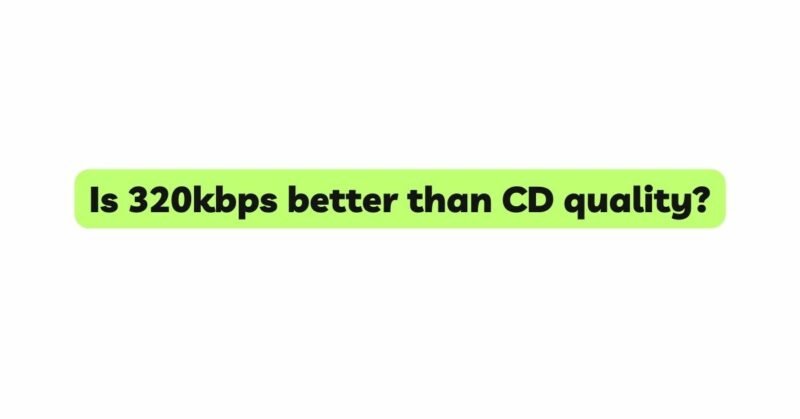In the world of digital audio, the debate between 320kbps (kilobits per second) and CD quality has been a topic of contention among audiophiles and music enthusiasts for years. While CD quality, also known as lossless audio, is often regarded as the pinnacle of sound fidelity, proponents of 320kbps argue that it offers a nearly indistinguishable listening experience with the added benefit of smaller file sizes. In this article, we will delve into the technicalities of audio compression, the differences between 320kbps and CD quality, and the subjective factors that influence our perception of sound quality, ultimately demystifying whether 320kbps is truly better than CD quality.
- Understanding Audio Compression:
Before comparing 320kbps and CD quality, it’s crucial to grasp the concept of audio compression. Audio files are compressed to reduce their size for easier storage and faster streaming. Lossy compression (like 320kbps) removes some audio data during the encoding process, whereas lossless compression (like CD quality) retains all the original audio data. We’ll explore the implications of these compression methods on sound quality and file sizes.
- CD Quality: The Gold Standard of Fidelity:
Compact Discs (CDs) have been long hailed as the gold standard of audio fidelity due to their lossless audio quality. We’ll delve into the technical specifications of CD audio (44.1 kHz sample rate and 16-bit depth) and discuss the benefits of having a full, uncompressed audio representation.
- The Rise of Digital Audio Formats:
With the advent of digital audio formats and online music platforms, lossy audio formats like MP3 (320kbps) gained popularity due to their smaller file sizes. We’ll explore the reasons behind the widespread adoption of 320kbps and the compromises it makes in audio quality.
- The Science of Perception: Can We Hear the Difference?
Human auditory perception plays a significant role in this debate. We’ll delve into the limits of our hearing and examine whether the average listener can perceive the differences between 320kbps and CD quality audio. Additionally, we’ll discuss the concept of “perceptual coding,” wherein some audio details are intentionally discarded, but the perceived quality remains intact.
- Subjective Listening Tests:
Subjective listening tests, where individuals listen to and compare different audio qualities, have been conducted to determine if there are noticeable differences between 320kbps and CD quality. We’ll examine the results of various studies and highlight the factors that might influence listeners’ preferences.
- Bitrate vs. Fidelity: Debunking the “Magic Number”:
The notion that 320kbps is the “sweet spot” for audio quality has led to debates about whether it’s superior to CD quality. We’ll analyze the concept of bitrate and explain why a higher bitrate doesn’t necessarily guarantee better audio fidelity.
- Storage and Bandwidth Considerations:
With the growing prevalence of streaming services and limited storage capacity on devices, file size becomes a crucial consideration. We’ll discuss the implications of choosing between 320kbps and CD quality based on storage and bandwidth constraints.
- Audiophile Perspectives:
Audiophiles, who are highly discerning listeners, often have strong opinions about audio quality. We’ll explore the perspectives of audiophiles on 320kbps vs. CD quality and their preferences for lossless formats.
- The Future of Audio Quality:
As technology continues to advance, new audio formats and encoding techniques emerge. We’ll explore the trends and innovations shaping the future of audio quality, such as high-resolution audio and immersive audio technologies.
Conclusion:
The question of whether 320kbps is better than CD quality is not a straightforward one, as it depends on various factors, including the listener’s preferences, the listening environment, and available resources. While CD quality is considered the ideal in terms of sound fidelity, 320kbps offers a practical compromise between file size and sound quality for most listeners. Ultimately, the choice between the two formats should be based on individual preferences and the specific use cases, with an appreciation for the advancements in audio technology that continue to shape our listening experiences.

